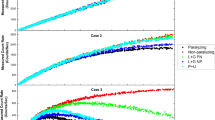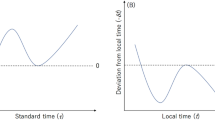Abstract
LOW-VOLTAGE halogen-quenched Geiger–Müller counters find increasing applications in many fields, especially for use in portable survey and assay instruments1. Their chief advantages are: (i) very low temperature coefficient down to – 50° C.; (ii) very long counting life; (iii) extreme electrical robustness; (iv) simple battery requirements; (v) large output pulse necessitating no pre-amplification.
This is a preview of subscription content, access via your institution
Access options
Subscribe to this journal
Receive 51 print issues and online access
$199.00 per year
only $3.90 per issue
Buy this article
- Purchase on Springer Link
- Instant access to full article PDF
Prices may be subject to local taxes which are calculated during checkout
Similar content being viewed by others
References
Franklin, E., and Loosemore, W. R., Proc. Inst. Elect. Eng. (in the press).
Laufer, A. R., Rev. Sci. Instr., 21, 244 (1950).
Wells, F. H., “A Recording Oscilloscope” (to be published).
Author information
Authors and Affiliations
Rights and permissions
About this article
Cite this article
LOOSEMORE, W., SHARPE, J. Time-delays in Low-voltage Halogen-quenched Geiger–Müller Counters. Nature 167, 600–601 (1951). https://doi.org/10.1038/167600b0
Issue Date:
DOI: https://doi.org/10.1038/167600b0
This article is cited by
-
Formative time lags of build-up process in halogen-quenched counters
Il Nuovo Cimento (1965)
-
The delay in the build-up of halogen-quenched counters
Applied Scientific Research, Section B (1954)
-
Properties of argon-bromine counters
Applied Scientific Research (1954)
-
Properties of argon-bromine counters
Applied Scientific Research, Section B (1954)
-
The delay in the build-up of halogen-quenched counters
Applied Scientific Research (1954)
Comments
By submitting a comment you agree to abide by our Terms and Community Guidelines. If you find something abusive or that does not comply with our terms or guidelines please flag it as inappropriate.



